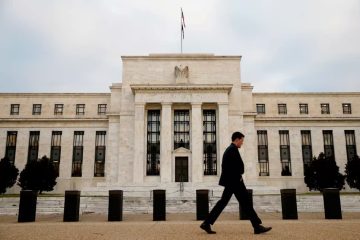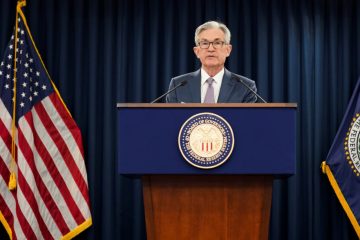Cryptocurrency Hedge Fund Gets VC Fred Wilson’s Backing Amid Bitcoin Slump

Union Square Ventures, the New York-based venture capital firm, is betting on yet another cryptocurrency hedge fund startup, Multicoin Capital.
Fred Wilson, the cofounder of USV, confirmed Wednesday that Multicoin is the sixth cryptocurrency fund the firm has invested in over the past year and a half. It’s also USV’s ninth active investment in the blockchain industry, including startups harnessing the decentralized technology behind Bitcoin.
While the size of the VC’s investment—which is a direct infusion into the hedge fund, not an equity stake in the company—was not disclosed, it brings Multicoin’s total assets under management to $ 75 million, according to a spokesperson for the fund.
That figure, which also factors in investment performance in the midst of a six-month-long selloff in Bitcoin and other cryptocurrencies, is up from the $ 50 million Multicoin said it had raised in March from investors including Marc Andreessen and David Sacks, a former PayPal executive who founded VC firm Craft Ventures. At the time, Multicoin cofounder Kyle Samani told Reuters that the firm expected to hit its total fundraising target of $ 250 million by the end of this month.
While Multicoin’s assets remain well below that goal, the firm still expects to reach at least $ 200 million in funding soon, with $ 250 million the maximum the fund will accept.
Austin-based Multicoin is a long/short fund, meaning it bets on digital assets it believes will rise in value, but also seeks to profit when the prices of other cryptocurrencies fall. Multicoin shorted the virtual asset market in March, when cryptocurrency hedge funds as a whole lost 34%, according to performance-tracking firm Hedge Fund Research. At the time Multicoin went bearish, Bitcoin had just enjoyed a brief but frenzied mid-February rally, which many investors believed would continue.
“A lot of our peers thought we were crazy,” Samani tells Fortune. “It was a good decision.”
Samani won’t disclose Multicoin’s returns, but says this year the fund has outperformed both the Bitwise HOLD 10 cryptocurrency index—a common benchmark for crypto investors—and Bitcoin itself.
Still, that doesn’t mean the hedge fund has made money in 2018, just that it’s managed relatively better: Both the HOLD 10 index and Bitcoin have shed more than half of their value so far this year.
Indeed, a source familiar with Multicoin told Fortune a month ago that the fund had surpassed $ 100 million in capital, but another rout in the cryptocurrency market in recent days appears to have eaten into the total, with the Bitcoin price down 20% over the past month.
Yet Multicoin’s willingness to take unpopular positions—the reasons for which Samani often lays out in extensive public reports coauthored with his cofounder Tushar Jain—apparently convinced Wilson and other investors that the fund can weather market downturns.
“Their opinions are often controversial and contrarian,” Wilson said of Multicoin’s cofounders in a blog post published Wednesday. “You can make a lot of money by being right about something most people think is incorrect.”
One example is EOS, an initial coin offering that raised $ 4 billion by the time its token sale ended earlier this month. Multicoin, which owns EOS tokens, released a bullish analysis of the cryptocurrency about a month after comedian John Oliver ridiculed the project on his HBO show Last Week Tonight.
That type of content has helped Multicoin attract investors, despite Samani and Jain’s lack of prior experience in the cryptocurrency industry or in the investment business. (Each previously founded separate healthcare startups.) Samani connected with Wilson, for one, when the VC messaged him on Twitter out of the blue.
“Our investors took a chance on us,” Samani acknowledges.
Those backers also include Andreessen Horowitz’s Chris Dixon; Vinny Lingham, CEO of blockchain identity platform Civic; Craft Ventures’ Bill Lee, Blocktower Capital’s Ari Paul; Passport Capital; and Vy Capital.
Multicoin invests 85% of its assets in a variety of actively traded (or liquid) cryptocurrencies, such as Bitcoin and Ethereum, which currently account for less than a fifth of the fund. Eventually, though, as the cryptocurrency market grows and becomes more liquid, Multicoin would “prefer not to hold” the top two virtual currencies, in favor of owning lesser-known coins, Samani says.
The remaining 15% of the hedge fund is invested in early cryptocurrency and blockchain projects whose tokens have yet to launch or begin trading. Examples of Multicoin’s investments include blockchain-based network, Spring Labs, enterprise blockchain company Kadena, and tokenized ticket sales startup Tari.
Besides Multicoin, Union Square Ventures has also invested in cryptocurrency funds Polychain Capital, Metastable Capital, Blocktower Capital, Autonomous Partners and Placeholder (the only VC-style fund of the bunch).
“USV has not become, and has no plans to become, a fund of funds,” Wilson wrote in his post. “But the blockchain/crypto/token sector has some unique challenges for us and others in the venture capital business and we have taken a network approach to solving them, at least for now.”





